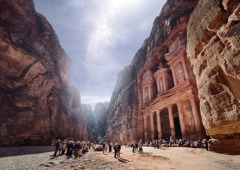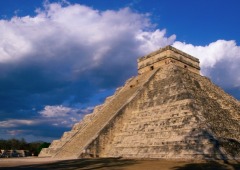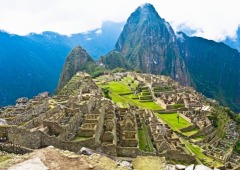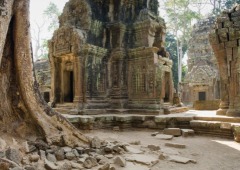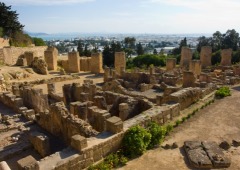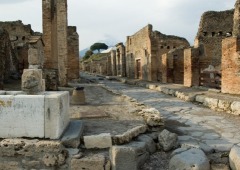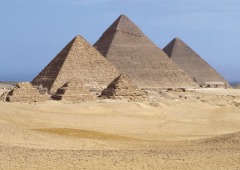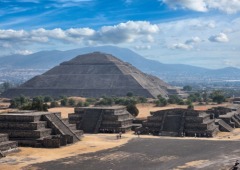China yearns for peace on southern flank
By Peter Lee
Beijing embarked on a well-received charm offensive at the BRICS summit at the city of Sanya on China's Hainan Island. Chinese President Hu Jintao and Indian Prime Minister Manmohan Singh met on April 13 in a sidebar of the gathering of leaders from Brazil, Russia, India, China and South Africa for a mini-reset of the oft-contentious relations between the two regional powers. [1]
China is obviously eager to repair some of the PR damage from the pummeling it took as the designated neighborhood bully on Diaoyutai Island, rare earths and South China Sea dust-ups.
But it also looks like the People's Republic of China (PRC) yearns for stability on its borders - and in the Tibetan Autonomous Region - as it nervously eyes the wave of popular protests sweeping the Middle East. Particularly in Syria, there is distinct - though vociferously denied - evidence that Bashar al-Assad's external enemies, both exiles and foreigners - are taking advantage of the unrest and the regime's faltering and brutal response to stoke violence, spread disinformation, and put the boot in on a hated foe. [2]
If and when popular unrest comes to China, Beijing would appreciate New Delhi's forbearance in making sure that its domestic political problems are not exacerbated by snowballing unrest in Tibet, fed by emigre agitation and the temptation of geopolitical competitors to meddle at China's expense.
The most significant Chinese concession at the Hainan forum was China's reported (in the Indian press) backpedalling on the arcane issue of stapled visas for residents of Kashmir and Arunachal Pradesh.
The Chinese practice of stapling a piece of paper with a visa in a passport (instead of stamping it directly in the book) for some residents of Kashmir and Arunachal Pradesh seeking to visit China dates at least to 2007.
It apparently was part of a Chinese campaign to formalize its position on the festering border conflicts between India and China by demonstrating in concrete form China's position that the status of these territories was disputed and not subject to the normal consular relations between the two countries.
India's stated posture has always been to refer the Sino-Indian border debate to the McMahon Line. The drawing of the McMahon Line was a bit of British mischief that shaved off parts of Tibet and present-day Pakistan, and included them in British India in order to create buffer zones.
Negotiated at the Indian town of Simla in 1914, the McMahon Line was apparently an egregious exercise in imperial cartography, defining the border only with a thick red line on a map without reference to the usual local landmarks employed to demarcate a border.
The negotiation of the Simla Accord gives a certain amount of aid and comfort to advocates of Tibetan independence because Sir Henry McMahon allegedly exceeded his instructions and concluded a deal with the Tibetan representatives after the Republic of China envoy left the talks.
By accepting the McMahon Line, the Tibetan team gave away a piece of territory in return for the transitory pleasure of negotiating directly with the British Empire. Having obtained the border deal it wanted, the British government occasionally but emptily asserted its right to deal with Tibet directly. However, in 2008, a British Foreign Office statement officially repudiated the implication of Tibetan independence contained in the Simla Accord.
No Chinese government has accepted the McMahon Line as the proper demarcation of the border. India, however, has embraced it.
Today, China occupies a fair amount of wasteland known as Aksai Chin in northern Kashmir that holds a strategic railroad linking Xinjiang and Tibet - claimed by India - and India occupies largely ethnic-Tibetan mountainland south of the McMahon Line in the northeastern province of Arunachal Pradesh - claimed by China. 
Much is made of the militarization of the border as a source of tensions, but it is possible that the opposite is true. As the border regions on opposite sides of the Line of Actual Control are integrated by new roads and railroads and secured by mobile, better-equipped military forces, the incentive to meddle across the border is reduced.
Belligerent posturing is, of course, another matter.
Indian recalcitrance seems to have something to do with assuaging the military establishment's still-burning resentment over getting thumped in the 1962 border war - which was fought largely in Arunachal Pradesh - and the popularity of sticking it to Beijing as a national pride/electoral strategy. The fattening of defense budgets on the Indian side in response to the perceived Chinese threat is also, of course, not unwelcome.
The logical solution to this issue would seem to be an exchange of claims on these marginal lands - China keeps Aksai Chin and India holds on to Arunachal Pradesh. But it hasn't happened yet, despite the creation of resolution mechanisms and over a dozen meetings in recent years.
The whys and wherefores have ignited entertaining and informative Internet flame wars between Indian, Chinese, and Tibetan advocates. [3]
However, a close look at the evidence appears to indicate that China has put an Aksai Chin for Arunachal Pradesh swap on the table for years - starting with Zhou Enlai in the 1950s - but the Indian government has found it in its interests to insist that the fate of the two regions be negotiated separately.
As India formalized its control over Arunachal Pradesh - it is now incorporated as an Indian state and not a border territory - the prospect of swapping recognition of Aksai Chin has become more remote. Instead, it became possible that India would simply hold on to Arunachal Pradesh and not bother to acknowledge the Chinese claim over Aksai Chin at all.
It appears that in 2010 the Chinese government was feeling its oats and decided it would try to play the separate negotiations game, too. If India insisted on discussing the problems separately, then China would try to get some two-on-one action on the Aksai Chin by pushing for India to talk with Pakistan on the overall Jammu & Kashmir issue.
China's search for alternate leverage led it to escalate its claims to both Aksai Chin and Arunachal Pradesh by harping on the ongoing visa issue.
In July 2010, the Chinese government apparently attempted to issue a stapled visa to Lt Gen B S Jaswal, General Officer Commanding-in-Chief of the Kashmir-based Northern Command, although it had given him a stamped visa in 2008. This emerged from the journalistic sausage-making machine as "China refuses visa to Indian general", and resulted in the breakdown in the high-level military exchanges between the two countries. [4]
In addition to the stapled visa shenanigans, China infuriated the Indian government by trying to interfere in Asian Development Bank deliberations on a US$2.9 billion Indian hydropower finance package because it included a $60 million Arunachal Pradesh component.
China also staked a claim to Tawang, a small market town of inordinate importance in Arunachal Pradesh because it was the birthplace of the sixth Dalai Lama and the place where the 14th Dalai Lama found Indian refuge after fleeing Lhasa in 1959. Tawang also hosts a large Gelugpa monastery that is reputedly the second-largest such installation in the world after Lhasa and enjoys the active patronage of the Dalai Lama.
In response, India rolled out the big guns.
Manmohan Singh made a high-profile visit to Arunachal Pradesh in October 2010 during the parliamentary election campaign, eliciting much unhappiness from the Chinese government. In November 2009, the Indian government allowed the Dalai Lama to make a rare visit to Arunachal Pradesh, and also to Tawang.
In an apparent recapitulation of the Tibetan delegation's sellout to the British at Simla in 1914, the Indian media reported that the Dalai Lama declared that Arunachal Pradesh and Tawang were "part of India".
The reference to Tawang is particularly striking because the Tibetan government, in its pre-exile days, had made repeated and intermittently successful efforts to maintain administrative control of Tawang, despite its location south of the McMahon Line.
In 1947, the Tibetan government wrote the Indian government to assert Tibetan authority over Tawang. But in 1950-51, the Indian government moved into the region and, from a facts-on-the-ground standpoint, settled the question of who ran Tawang for once and for all. [5]
The Tibetan government-in-exile has historically accepted the McMahon Line - and the loss of what the Chinese call "South Tibet" - as the cost of doing business with the Indian government. It was, however, somewhat jarring for the Dalai Lama to accept India's control of Tawang instead of asserting its fundamental Tibetaness.
According to the Times of India, the Dalai Lama did so in categorical terms:
"My stand that Tawang is an integral part of India has not changed," the Dalai Lama said in defense of his host country. [6]However, another outlet reported the Dalai Lama's position as being somewhat more nuanced. Instead of tackling the Tawang question head-on, he hypothesized that the Chinese pullback from Tawang after the People's Liberation Army occupied the town in the 1962 border war - meant to re-establish the ante-bellum status quo as a prelude to negotiations with India - implied that Beijing had surrendered its right to contest Tawang's nationality:
If China claimed Tawang, then the army should not have left. The Dalai Lama hinted that China's current claims are an afterthought. "The then Chinese government declared a unilateral ceasefire and withdrew [its forces]. Now the Chinese have got different views. This is something which I really don't know. I am little bit surprised," he said. [7]In any event, the Dalai Lama's visit and his remarks as reported did send a useful message to China that restoring the territorial integrity of the Tibetan homeland by clumping parts of Arunachal Pradesh into the Tibetan Autonomous Region enjoyed no support from the Tibetan diaspora and was useless as a negotiating point.
Meanwhile, Pakistan, hopelessly transfixed on the cleft stick of its Afghanistan/Taliban/US war on terror disaster, showed itself uninterested in adding to its headaches by arguing with India over Kashmir. Therefore, China's attempts to match India's "separate negotiations" stance on Aksai Chin and Arunachal Pradesh were going nowhere.
At Hainan, the Chinese government appeared more willing to resign itself to the current border muddle, while tending to more important elements of its relationship with India: trade and security issues.
Calls for democracy in the Middle East have been unremitting, and the Chinese government is apparently acting pre-emptively on the assumption that something similar may break out in China. Activists, dissidents, and lawyers have been detained by the bushel-basket, and Internet censors are working overtime.
Although the examples of Egypt and Libya have demonstrated that negotiated forbearance between the Western democracies and authoritarian governments can evaporate almost instantaneously as popular unrest manifests itself, it appears that China decided this is not the time to be at loggerheads with India.
Therefore, four Kashmiri Indian journalists - of whom at least one had a passport issued in Kashmir and not New Delhi - were given conventional visas to go to Hainan, apparently giving rise to the report that China was moderating its stance on the "stapled visa" issue.
The Hindustan Times, reporting from the China-bashing quadrant, received a self-congratulatory background briefing from someone in the Indian government that made the case that the switch in policy was evidence of Chinese incompetence:
Indian officials are smiling like Cheshire cats as China quietly pulls back on a Kashmiri policy that roiled relations the past two years ... Today, Indian officials are coming around to the view that the Kashmir shift and unshift was really evidence of incoherence within the Chinese system. "Beijing is struggling to handle the demands of an increasingly demanding world," said one. China, superpower in the making, was more stumbling than sinister. ...This allegation of Chinese disorganization and ineptitude may be gratifying to the Indian diplomatic service, which often faces accusations of disorganization and ineptitude itself.
New Delhi, after a careful review of the information, has concluded the two Kashmiri moves arose from decisions at lower level bureaucrats designed to placate a weakening Pakistan. Little or no thought was given about the consequences. Worse, organizations like the Chinese foreign ministry who would have known better were out of the loop. Thus the Northern Command decision was taken by a low-level national ministry of defense. "May be the clerk had something against the Northern Command," said one official.
What there is no doubt about is that China was completely taken aback at the strength of Indian response. The Chinese, say sources, may have concluded the Kashmir policy would not be a big deal given India's track record of keeping quiet on many other issues with China.
Having made a blunder, the problem say Indian officials was that "Beijing didn't know how to walk it back."
Initial Indian complaints bounced off China. The real game-changer was when, at a foreign secretaries meeting in Sichuan last year, India hinted it would change its Tibet and Taiwan policies. India declined to endorse the one China policy when Premier Wen Jiabao came visiting in December last year. [8]
However, the facts of the case - that stapled visas were given to weightlifters from Arunachal Pradesh trying to attend a competition in China (indeed, stapled visas were given to residents of Arunachal Pradesh as early as 2007) as well demanded for a general from Jammu & Kashmir - implies that more than purported resentment against "Northern Command" by a disgruntled clerk in the Chinese Ministry of Defense was at work.
And the intimidating character of India's representations to Premier Wen in December 2010 apparently did not deter China from issuing stapled visas to the two weightlifters in January 2011, less than a month after Wen's visit.
As the Economic Times put it:
In spite of Premier Wen Jiabao's assurance that China will take serious note of India's concerns over the issue of stapled visas, the handing over of such documents to two Arunchalis prevented them from flying to Beijing on Wednesday. [9]Perhaps the purpose of this backgrounder is to make the case that the stapled visa issue was merely a blunder and China's change of posture therefore did not merit any reciprocation from India.
Also, the concession was framed in terms of Jammu & Kashmir alone - not addressing any Arunachal Pradesh factor - indicating that the Indian government was happy to advertise that China was backing off on interfering in Kashmir just as New Delhi and Srinigar brace themselves for the possibility of another long, hot summer of rock throwing, head cracking, and the intemperate use of various lethal and occasionally lethal non-lethal ordinance by Indian security forces in Kashmir.
However, if India helps keep a lid on dissent, criticism, and incitement in the southwest as China nervously enters its own season of dissent, with those warm, dry days and nights so well suited to marching, camping, and other activities, enduring some self-congratulatory preening by India - and the erosion of China's bargaining stance on the contentious border issues - might be an acceptable price to pay.
Notes:
1. Hu steps forward, Indian Express, Apr 15, 2011.
2. Syria and the Delusions of the Western Press, CounterPunch, Apr 15 – 17, 2011.
3. A Brief History of the Sino-Indian Border Dispute and the role of Tibet, Fool's Mountain, Mar 26, 2010.
4. Lt Gen BS Jaswal had visited China in 2008, Daily News Analysis, Aug 28, 2010.
5. McMahon Line, Wikipedia.
6. Dalai Lama lands in Tawang, hits out at Beijing 'hard line', Times of India, Nov 9, 2009.
7. Dalai Lama questions China's claim to Tawang, Daily News Analysis, Nov 9, 2009.
8. China's flip-flop on Kashmir, Hindustan Times, Apr 15, 2011.
9. China issues 'invalid' stapled visas to Arunachal Pradesh residents, The Economic Times, Jan 13, 2011.
Peter Lee writes on East and South Asian affairs and their intersection with US foreign policy.
http://www.atimes.com/atimes/China/MD22Ad01.html
__._,_.___



